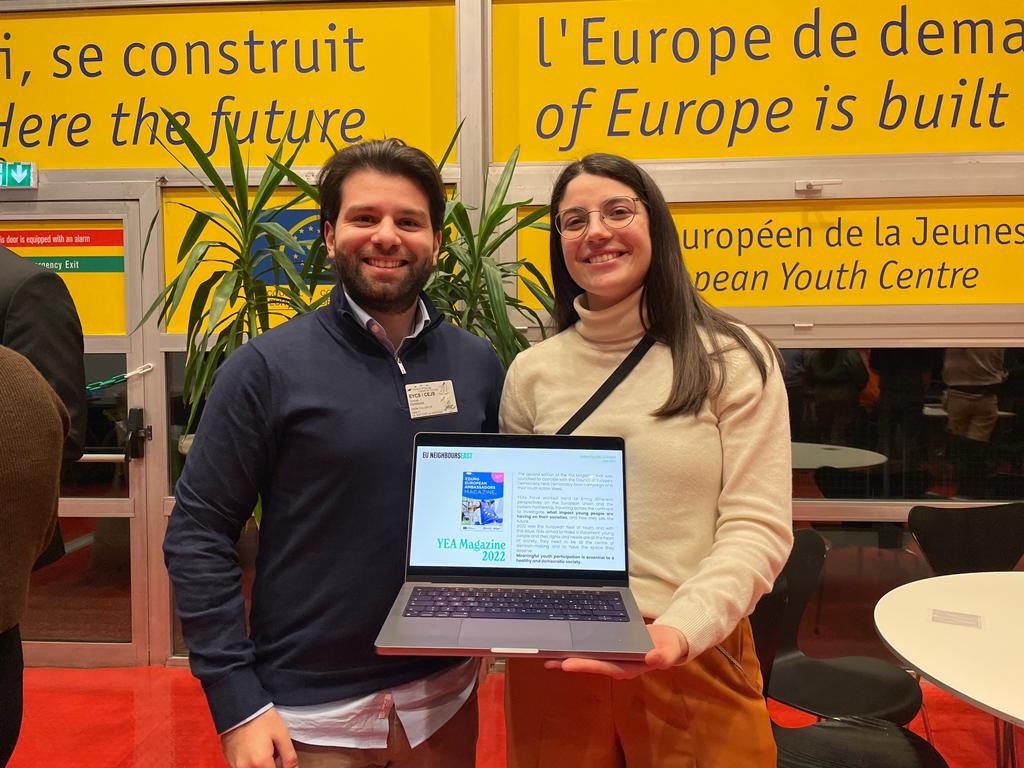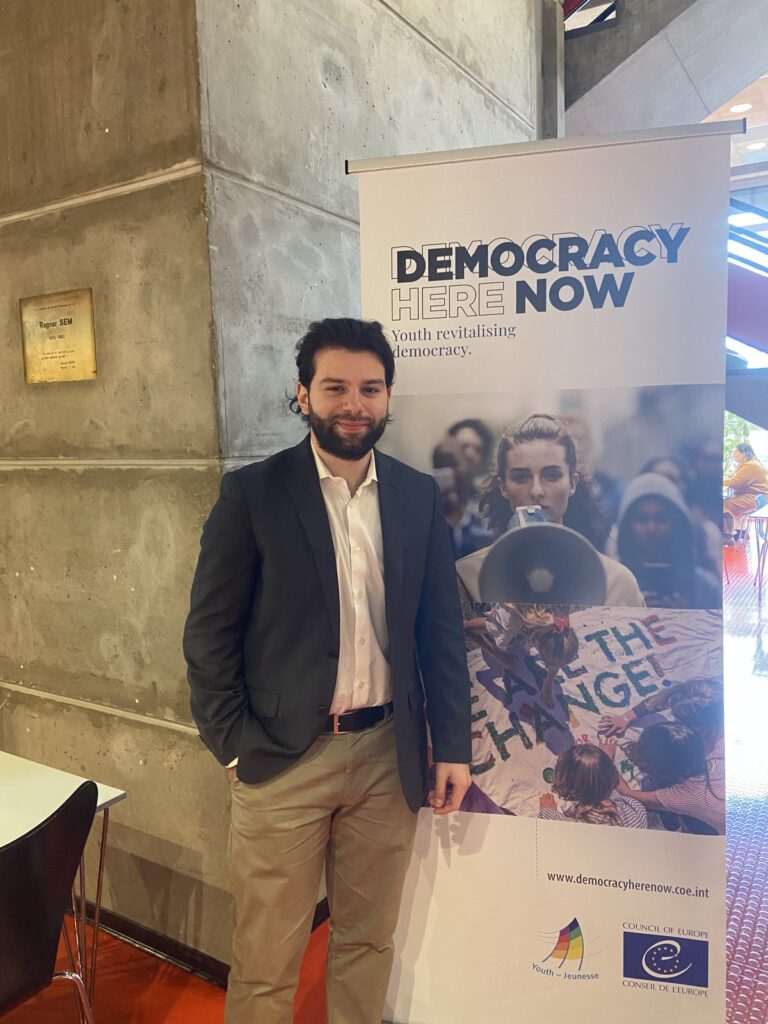
Blog: What’s next for Democracy?
Democracy, as a form of governance, has come a long way since its inception. In recent times, however, it has faced numerous challenges. Despite this, there is still a glimmer of hope for the future of democracy, as young people are stepping up and stepping in to revitalise the system and bring new energy and ideas to the political arena. This was the overall vision of the ‘Evaluation and Follow-up Conference of the Democracy Here, Democracy Now Campaign of the Council of Europe’ that took place from 31 January to 2 February 2023, bringing EU Coordinator for the Young European Ambassadors (YEAs) Maria Pia Napoletano and YEA Gonçalo Ferreira together with roughly 60 young people from all over Europe, to sit down and discuss how we can keep contributing to bolstering democracy.

The main objective of this conference was to investigate what has been done during the Council of Europe campaign, including the 50 Calls for Action, and provide new ideas, plans and actions that can be implemented in the future at a European, regional and national level.
With the proper tools and the support of an amazing team of facilitators and speakers, we had the opportunity to work together and brainstorm in smaller working groups and give our proposals for a more democratic Europe. Through this process, we all contributed to the creation of a conference report that will serve, substantially, for the follow-up of the campaign in years to come.
Here are the general outcomes and conclusions of the conference:
Training and Capacity Building
Training and capacity building plays a crucial role in bolstering democratic youth participation by empowering young people with the skills and knowledge they need to engage effectively in the democratic process.
Through training, young people can learn about their rights and responsibilities as citizens, as well as the workings of the democratic system. This knowledge can help young people make informed decisions and engage in political processes with confidence. Additionally, training can help young people develop important skills such as public speaking, negotiation and leadership, which are all essential for successful political participation.
Capacity-building programmes, such as mentorship and networking opportunities, can also help young people build relationships and connections with other individuals and organisations committed to promoting democracy and youth engagement. This can help young people access the resources, information, and support that they may need to get involved in political activities and make a positive impact.
Common Action Days
Common actions around key dates in the international human rights calendar provide a sense of acting together and make it possible to highlight issues relevant to all stakeholders. Common actions will be organised in the format of Action Days of the No Hate Speech Movement campaign (and may be applied by partners in action weeks or months) and will allow for concerted action online and offline.
The conclusions acknowledged that international days should work as a way for these common action day events to achieve greater visibility and impact, and recognised the importance of networking as a platform for sharing ideas, and plans and being able to promote these events in a collaborative vision.
These events are valuable for promoting democratic youth participation and creating a more inclusive and representative democracy, since they promote community and solidarity among young people, provide a platform for young people to voice their opinions and develop their leadership and advocacy skills, and help to create a supportive network of peers.
Advocacy and Lobbying
Strengthening youth advocacy and lobbying efforts is essential for promoting the interests and perspectives of young people in the political process. By advocating for their rights and interests, young people can help to ensure that their voices are heard and that their needs are represented in decision-making processes. We can build a more inclusive, representative, and democratic society that truly reflects the needs and perspectives of all citizens, including young people, by following these steps:
- Building a strong coalition: youth can work together with other organisations and groups that share their goals and objectives to build a strong coalition. This will allow them to pool resources and leverage their collective influence to engage with key stakeholders.
- Developing a clear message: it is important for youth to develop a clear and concise message that clearly articulates their goals and objectives. This will help them to communicate effectively with key stakeholders and ensure that their message is heard loud and clear.
- Engaging with decision-makers: young people can engage with decision-makers by participating in public consultations, submitting written statements, and speaking at public events. This will give them the opportunity to make their voices heard and influence decision-making processes.
- Building relationships: young people can build relationships with key stakeholders by participating in events, attending meetings, and engaging in regular dialogue. This will help them to establish trust and credibility with decision-makers and foster a constructive working relationship.
- Leveraging technology: youth can leverage technology to reach a wider audience and engage with key stakeholders. This can include using social media platforms to spread their message, creating online petitions, and using other digital tools to mobilise support.
By taking these steps, young people can strengthen their advocacy and lobbying efforts and engage effectively with key stakeholders, such as the Congress of Local and Regional Authorities, the Parliamentary Assembly and at a national level as well. This will help them to promote their goals and make a positive impact in their communities and beyond.

Communication, Networking, and Visibility
Communication, networking, and visibility are critical components that support learning and networking among youth, giving visibility to their actions, activities, and initiatives. By utilising effective communication strategies, building networks of support, and ensuring visibility for their efforts, young people can maximise the impact of their actions and ensure that their perspectives are heard.
- Communication: effective communication is key to building strong relationships and networks of support among the youth. By using a variety of communication channels, such as social media, email, and in-person meetings, youth can share information, exchange ideas, and collaborate on projects. This will help them to learn from one another and build a supportive network of peers.
- Networking: building networks of support is an important step towards promoting youth efforts and initiatives. By connecting with like-minded individuals and organisations, young people can gain access to resources, knowledge, and support that will help them to achieve their goals. This will also provide them with opportunities to collaborate and work together on projects that can have a positive impact on their communities and beyond.
- Visibility: giving visibility to the actions, activities, and initiatives undertaken by young people is crucial for promoting their efforts and raising awareness about the issues they care about. By utilising social media, hosting public events, and participating in public consultations, youth can ensure that their voices are heard, and their perspectives represented in the political process. This will help to build support for their initiatives and ensure that their efforts are recognised and valued.
In conclusion
The future of democracy is in the hands of the young people who are working to revitalise it. With their energy, passion, and commitment, they are bringing new ideas and perspectives to the political arena, making democracy more inclusive, representative, and responsive to the needs of all citizens. While there are challenges ahead, there is reason to be optimistic about the future of democracy if young people remain engaged and continue to fight for a better tomorrow, as long as youth participation is enabled, and young people do not have to live in precarious situations, and as long as all young people are able to be who they want to be.
To end, I will leave you with a phrase said by a speaker during the Conference: “Room for just a picture is not enough. We need a seat at the table!”
LATEST

How you can help the planet every day

Building Europe: Poland’s experience of joining the European Union and lessons for Ukraine

World Health Day 2024: My Health, My Right

EUREKA MEETS EUROPE – opportunities to develop and study. My experience

Can you wear pink in the workplace?
More campaign pages:
Interested in the latest news and opportunities?
This website is managed by the EU-funded Regional Communication Programme for the Eastern Neighbourhood ('EU NEIGHBOURS east’), which complements and supports the communication of the Delegations of the European Union in the Eastern partner countries, and works under the guidance of the European Commission’s Directorate-General for Neighbourhood Policy and Enlargement Negotiations, and the European External Action Service. EU NEIGHBOURS east is implemented by a GOPA PACE-led consortium. It is part of the larger Neighbourhood Communication Programme (2020-2024) for the EU's Eastern and Southern Neighbourhood, which also includes 'EU NEIGHBOURS south’ project that runs the EU Neighbours portal.

The information on this site is subject to a Disclaimer and Protection of personal data. © European Union,